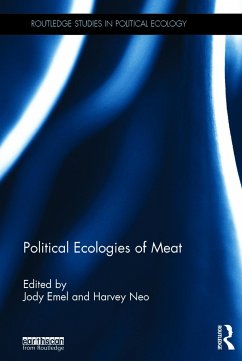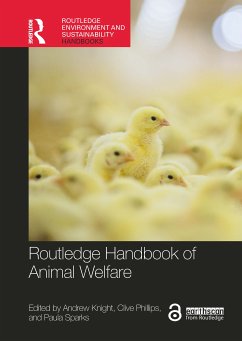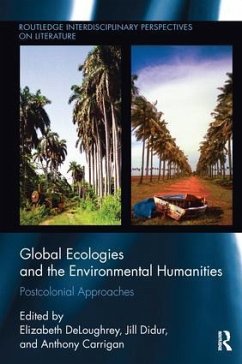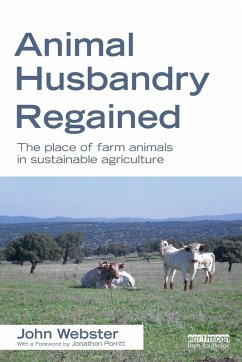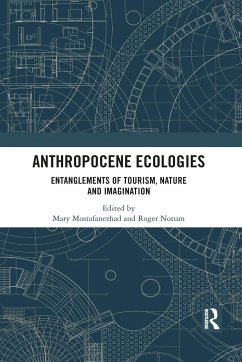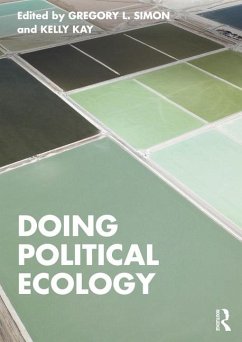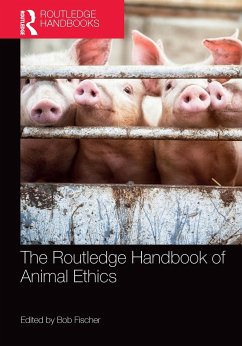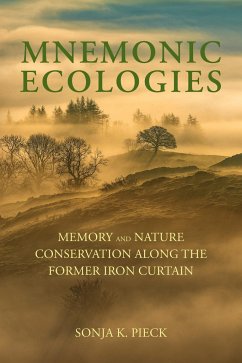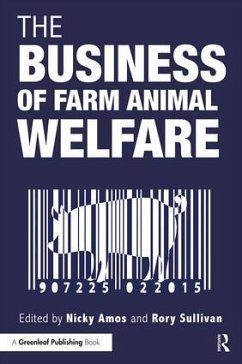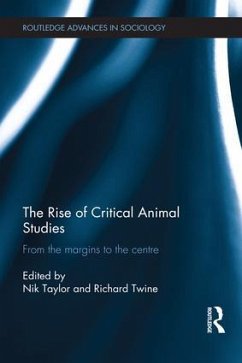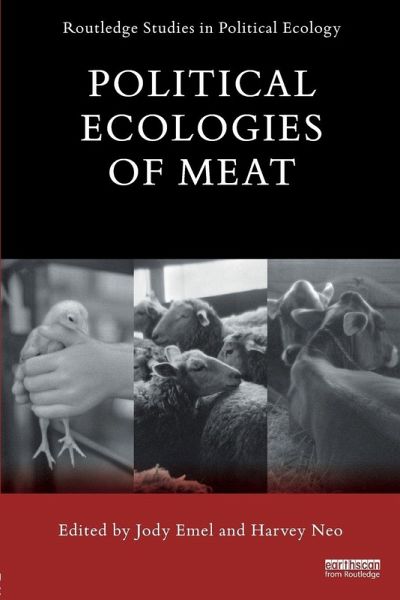
Broschiertes Buch
Political Ecologies of Meat
Versandkostenfrei!
Versandfertig in 6-10 Tagen

PAYBACK Punkte
24 °P sammeln!





This book tackles the key issues of contemporary meat production and consumption through a lens of political ecology, which emphasizes the power relations producing particular social, economic and cultural interactions with non-human nature.
Jody Emel is Professor of Geography at Clark University, USA. Harvey Neo is an Assistant Professor in the Department of Geography at the National University of Singapore.
Produktdetails
- Routledge Studies in Political Ecology
- Verlag: Taylor & Francis
- Artikelnr. des Verlages: Y160619
- 1st ed.
- Seitenzahl: 392
- Erscheinungstermin: 20. Mai 2015
- Englisch
- Abmessung: 234mm x 156mm x 21mm
- Gewicht: 593g
- ISBN-13: 9780415736954
- ISBN-10: 0415736951
- Artikelnr.: 42478872
Herstellerkennzeichnung
Libri GmbH
Europaallee 1
36244 Bad Hersfeld
gpsr@libri.de
"In a world where food has become the focal point of environmental politics, it's high time for an unflinching survey of meat. From the economy of farmed fish and livestock genetics to the politics of rainforest ranching and Halal slaughter, Emel and Neo's superlative collection has something to surprise and engage everyone: researchers, activists and consumers." - Paul Robbins, Director of the Nelson Institute for Environmental Studies at the University of Wisconsin-Madison, USA and author of Lawn People and Political Ecology.
"With meat squarely on the public agenda, this book could not come at a better time. Constituting a range of case studies on the many dimensions of
"With meat squarely on the public agenda, this book could not come at a better time. Constituting a range of case studies on the many dimensions of
Mehr anzeigen
industrial meat production, this book pushes beyond the simple debates of meat or no meat and asks readers to think more deeply of how we as human animals want to live with our non-human animal co-inhabitants." - Julie Guthman, University of California - Santa Cruz, USA and author of Agrarian Dreams: the Paradox of Organic Farming in California and Weighing In: Obesity, Food Justice and the Limits of Capitalism.
"If the project of animal geography is to make non-humans and our relations with them visible and accountable in our socio-spatial understanding, then this excellent volume does just that, placing the industrialised lives and deaths of farmed livestock, without alibi, at the centre of a critical bio-political ecology." - Henry Buller, University of Exeter, UK, appointed member of the Farm Animal Welfare Committee (FAWC) and Chair of the FAWC/Defra Welfare at Killing group.
"By broaching topics of systematic exploitation and injustice within the livestock industry, the book brings a multitude of environmental, political, and economic contradictions into the spotlight. Perhaps exposure is the first step towards advocacy." - Heide K. Bruckner, University of Graz, Austria
"If the project of animal geography is to make non-humans and our relations with them visible and accountable in our socio-spatial understanding, then this excellent volume does just that, placing the industrialised lives and deaths of farmed livestock, without alibi, at the centre of a critical bio-political ecology." - Henry Buller, University of Exeter, UK, appointed member of the Farm Animal Welfare Committee (FAWC) and Chair of the FAWC/Defra Welfare at Killing group.
"By broaching topics of systematic exploitation and injustice within the livestock industry, the book brings a multitude of environmental, political, and economic contradictions into the spotlight. Perhaps exposure is the first step towards advocacy." - Heide K. Bruckner, University of Graz, Austria
Schließen
"In a world where food has become the focal point of environmental politics, it's high time for an unflinching survey of meat. From the economy of farmed fish and livestock genetics to the politics of rainforest ranching and Halal slaughter, Emel and Neo's superlative collection has something to surprise and engage everyone: researchers, activists and consumers." - Paul Robbins, Director of the Nelson Institute for Environmental Studies at the University of Wisconsin-Madison, USA and author of Lawn People and Political Ecology.
"With meat squarely on the public agenda, this book could not come at a better time. Constituting a range of case studies on the many dimensions of industrial meat production, this book pushes beyond the
"With meat squarely on the public agenda, this book could not come at a better time. Constituting a range of case studies on the many dimensions of industrial meat production, this book pushes beyond the
Mehr anzeigen
simple debates of meat or no meat and asks readers to think more deeply of how we as human animals want to live with our non-human animal co-inhabitants." - Julie Guthman, University of California - Santa Cruz, USA and author of Agrarian Dreams: the Paradox of Organic Farming in California and Weighing In: Obesity, Food Justice and the Limits of Capitalism.
"If the project of animal geography is to make non-humans and our relations with them visible and accountable in our socio-spatial understanding, then this excellent volume does just that, placing the industrialised lives and deaths of farmed livestock, without alibi, at the centre of a critical bio-political ecology." - Henry Buller, University of Exeter, UK, appointed member of the Farm Animal Welfare Committee (FAWC) and Chair of the FAWC/Defra Welfare at Killing group.
"By broaching topics of systematic exploitation and injustice within the livestock industry, the book brings a multitude of environmental, political, and economic contradictions into the spotlight. Perhaps exposure is the first step towards advocacy." - Heide K. Bruckner, University of Graz, Austria
"If the project of animal geography is to make non-humans and our relations with them visible and accountable in our socio-spatial understanding, then this excellent volume does just that, placing the industrialised lives and deaths of farmed livestock, without alibi, at the centre of a critical bio-political ecology." - Henry Buller, University of Exeter, UK, appointed member of the Farm Animal Welfare Committee (FAWC) and Chair of the FAWC/Defra Welfare at Killing group.
"By broaching topics of systematic exploitation and injustice within the livestock industry, the book brings a multitude of environmental, political, and economic contradictions into the spotlight. Perhaps exposure is the first step towards advocacy." - Heide K. Bruckner, University of Graz, Austria
Schließen
Für dieses Produkt wurde noch keine Bewertung abgegeben. Wir würden uns sehr freuen, wenn du die erste Bewertung schreibst!
Eine Bewertung schreiben
Eine Bewertung schreiben
Andere Kunden interessierten sich für




